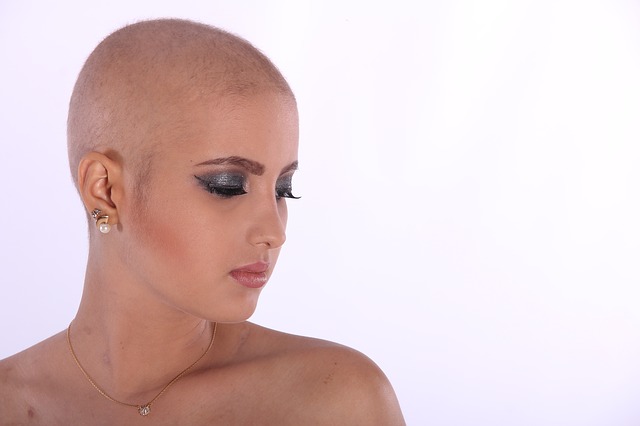If your hair is thinning or falling out it could be due to stress, heredity, mineral deficiency, hormonal or some other factor. Everyone loses approximately 100 hairs a day out of the 100,000 contained by the average scalp and this is due to:
Female Hair Loss
If your hair is thinning or falling out it could be due to stress, heredity, mineral deficiency, hormonal or some other factor. Everyone loses approximately 100 hairs a day out of the 100,000 contained by the average scalp and this is due to:
Lifespan: Average lifespan of a single hair is 4.5 years; when hair falls out it is replaced in 6 months by a new hair.
Styling: Shampooing, blow drying, and brushing hair.
Aging: After age 30 (sometimes prior), men and women start losing hair, though men do so at a faster rate.
Hereditary Hair Loss: due to an insufficient amount of hairs growing back to replace shed hairs and associated with:
Gender: Hereditary, or “pattern” baldness – more common in men than women.
Age: By age 30, 1 in 4 men are balding; by age 60, 2 in 3 men are balding or bald.
Hormones: Any imbalance can have affect on hair.
Stress: Excessive physical/ emotional stress, associated with injury, illness or surgery, can contribute to following types of hair loss:
Telogen effluvium – more common but less severe type of hair loss. Hair ceases growing and lies dormant, falling out 2 or 3 months later and growing back in 6 to 9 months.
Alopecia areata involves a white blood cell attack on hair follicles. Hair falls out in weeks, usually in patches, can involve entire scalp and even body hair. Hair may grow back, however treatment may be required.
Other Causes:
- Illness
- Mineral deficiencies
- Eating disorders – bulimia, anorexia
- Perms/chemicals
- Hormonal imbalance
- Liver, thyroid, adrenal or ovarian disorder
- Pregnancy, childbirth, contraceptive pill, HRT
- Medication/Chemotherapy
- Autoimmune disorders i.e. lupus
- Recent hepatitis B injections
- Severe infection
- Allergies
- Heavy metal toxicity
If your hair is thinning, you experience baldness and/or you are under 25 seek professional advice. If you are stressed/have other health issues quoted then look at changing your lifestyle and resolving.
Women may experience scalp hair loss from any age into their 50’s or later. Can be temporary such as pregnancy, illness or shock.
Women tend to have less obvious patterns of hair loss than men. Non-pattern types of hair loss are more frequent in women than men.
A likely cause of scalp hair loss is androgenic alopecia an inherited sensitivity to androgens (male hormones) on scalp hair follicles. Here, women do not develop true baldness like patterns occurring in men.
Female pattern hair loss can begin in late teens to early 20s when early puberty was experienced. If left untreated in puberty hair loss can progress to more advanced hair loss.
Women who suffer from Polycystic Ovarian Syndrome (PCOS) usually have higher levels of androgens or are menopausal, hair on the head is thinning, and facial becomes coarser. Though new hair is not produced, follicles remain alive, suggesting the possibility of new hair growth.
Non-Pattern Causes Of Hair Loss:
Trichotillomania – compulsive hair pulling.
Alopecia areata – autoimmune disorder causing patchy hair loss.
Triangular alopecia – loss of hair in the temporal areas can begin in childhood.
Scarring alopecia – hair loss due to scarring of the scalp.
Telogen effluvium – large percentage of scalp hairs are shifted into “shedding” phase.
Seek professional advice from a doctor/hair restoration specialist who can advise of a medical or surgical treatment.
Natural Therapies Can Help:
Obtain blood tests to ascertain levels of all hormones, minerals and physiology of the body including immunity, urinary and liver function to indicate a clearer picture of underlying deficiencies/imbalances that could be due to malabsorption/poor digestive function all treated with nutritional supplementation/diet.
Essential nutrients are B complex, biotin, manganese, zinc, iron and essential fatty acid. Correct dosage is required so seek naturopathic advice. Herbal medicine and homeopathic remedies restore balance to hormones and liver function.
Stress management/meditation, possibly hypnotherapy/counseling. Root cause must be addressed. I have seen excellent results with natural remedies.
Replace all chemical/synthetic hair products with natural ones. Regular scalp massage with jojoba oil blended along with specific essential oils.
Please note; essential oils are very potent, seek professional advice before use. Determine sensitivities, any skin allergies etc prior to use of any new products.
You can find much more information on living a holistic lifestyle in these free magazines and on our YouTube channel.
Lyn Craven






